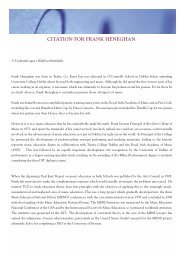TWICE THE SIZE - DIT Update - Dublin Institute of Technology
TWICE THE SIZE - DIT Update - Dublin Institute of Technology
TWICE THE SIZE - DIT Update - Dublin Institute of Technology
Create successful ePaper yourself
Turn your PDF publications into a flip-book with our unique Google optimized e-Paper software.
For the prosperous cities <strong>of</strong> the Conurbation, the Cork node, and especially the new “science<br />
city” <strong>of</strong> Tara in Meath, Ireland’s concentration upon information technology and biotechnology<br />
has paid-<strong>of</strong>f handsomely. World-class researchers, attracted by super-salaries, have led to the<br />
race to achieve biological programming <strong>of</strong> proteins and the integration <strong>of</strong> nano-materials. A new<br />
nano-technology centre <strong>of</strong> excellence, driven by AIT, starts to emerge in Athlone and other<br />
Midlands cities. The result has been a ‘human-body-repair’ capability, transforming traditional<br />
notions and functions <strong>of</strong> hospitals, doctors and nurses. Technological supports to human<br />
performance – so long limited to the likes <strong>of</strong> hearing-aids, blood-pump boosters and prosaic<br />
prosthetics – took a giant leap with ‘humorphing’. When e-technology finally could match the<br />
electro-chemical processes <strong>of</strong> the brain, the advent <strong>of</strong> machine synthesis had dawned, and now<br />
the future for the artificial manipulation <strong>of</strong> human knowledge is truly awesome – and its<br />
potential commercial exploitation seemingly limitless. In addition to all this, the longestablished<br />
Mayo Clinic near Castlebar is now leading the world into the research and<br />
development <strong>of</strong> human cloning and cryogenics, resulting in mass protests by ethical groups and<br />
high levels <strong>of</strong> commercial security.<br />
Money has become completely digital and intelligent systems are everywhere. This<br />
‘digitisation’ <strong>of</strong> the economy and ‘wiring’ <strong>of</strong> society has deepened social exclusion as advanced<br />
communication systems benefit the better-<strong>of</strong>f. Likewise, leisure time increases for the<br />
pr<strong>of</strong>essional classes, as working-hours have steadily declined over the past 15 years, and leisure<br />
itself is characterised by high levels <strong>of</strong> consumption, more active life styles and greater<br />
mobility. A number <strong>of</strong> very attractive leisure/cultural hubs attracts the population - Dundalk,<br />
Wicklow and Wexford within the Conurbation and Sligo, Kerry and Galway in the West. Homeworking<br />
is prevalent, and many skilled workers telecommunicate their work from rural abodes<br />
that are technologically ‘smart’ but environmentally expensive.<br />
Computers, as such, have just about disappeared as most information and communications<br />
technologies have become embedded in their functional artefacts responding to speech, touch<br />
and gesture. Consumer behaviour has also been revolutionised, and the e-tail and the virtual<br />
arcade have replaced the traditional shopping centre; though specialist shops <strong>of</strong>fering exclusive<br />
goods and services, as well as a shopping experience, flourish.<br />
Sustainability<br />
Rapid economic growth, combined with regulatory neglect, has brought rapid worsening levels<br />
<strong>of</strong> pollution and congestion to the country’s centres <strong>of</strong> population. There is, however, a strong<br />
movement towards the ‘marketisation’ <strong>of</strong> the environment, with explicit monetary values<br />
ascribed to a wide range <strong>of</strong> resources and environmental services. Access to these services is<br />
limited through charging, or by allocating rights that can be traded. The rise <strong>of</strong> corporate<br />
social responsibility, moreover, has raised the level and degree <strong>of</strong> self-regulation and<br />
accountability in the market.<br />
General apathy persists in Ireland towards climate change, though the situation dramatically<br />
worsens worldwide, and a market-based regime fails to reduce greenhouse gas emissions.<br />
107








